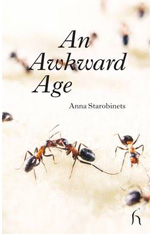

Hesperus Press, hardcover, 9781843917144
Having been nominated for Russia's National Bestseller Prize, Anna Starobinets is already being given the title of horror queen within the Russian short fiction genre. With her debut collection, An Awkward Age, she is able to delve into our basic fears with great conviction. These are not stories about monsters and serial killers, but instead, they are a psychological look into what we try to shun and pretend doesn't exist--and moreover, what we never want to have happen to us.
This chilling book begins with the story "The Agency". We are introduced to a man who earns his living by altering the lives of others, literally writing their fate in a script to be acted out according to his client's desires. But sometimes the client's demands become too personal and he discovers that he might just be an actor in another person's script. From here we are introduced to a child who is developing severe obsessive compulsive disorder. In yet another story, we meet a man whose identity has been stolen; he is persuaded to accept his new life until that too is destroyed and he is forced to return to his original life. Has he experienced an exciting train ride into another dimension, or simply a bout of too much drinking?
The star of the book, however, is the story for which the book is named: "An Awkward Age". A young boy slowly starts to deform and morph into a being incapable of human relations and devoid of basic human instincts. It's all initially mistaken as a bad case of puberty until his mother discovers his diary after he and his twin sister disappear. This is a disturbing story with a hopeless ending that makes you question if any other fate could have been better than the one revealed.
With Starobinets, every story is as clever as the next, yet there is an almost repulsive
air to her work. The situations in which these characters find themselves can make the reader
want to close the book so as not to witness the inevitable train wreck. But unlike a train
wreck where a life is simply cut short, these characters are forever doomed to ask "Why me?
Why this?" as not a single one will ever be able to find a reason to explain what went wrong
and why. And isn't that the most pivotal fear one can encounter: what's next?
